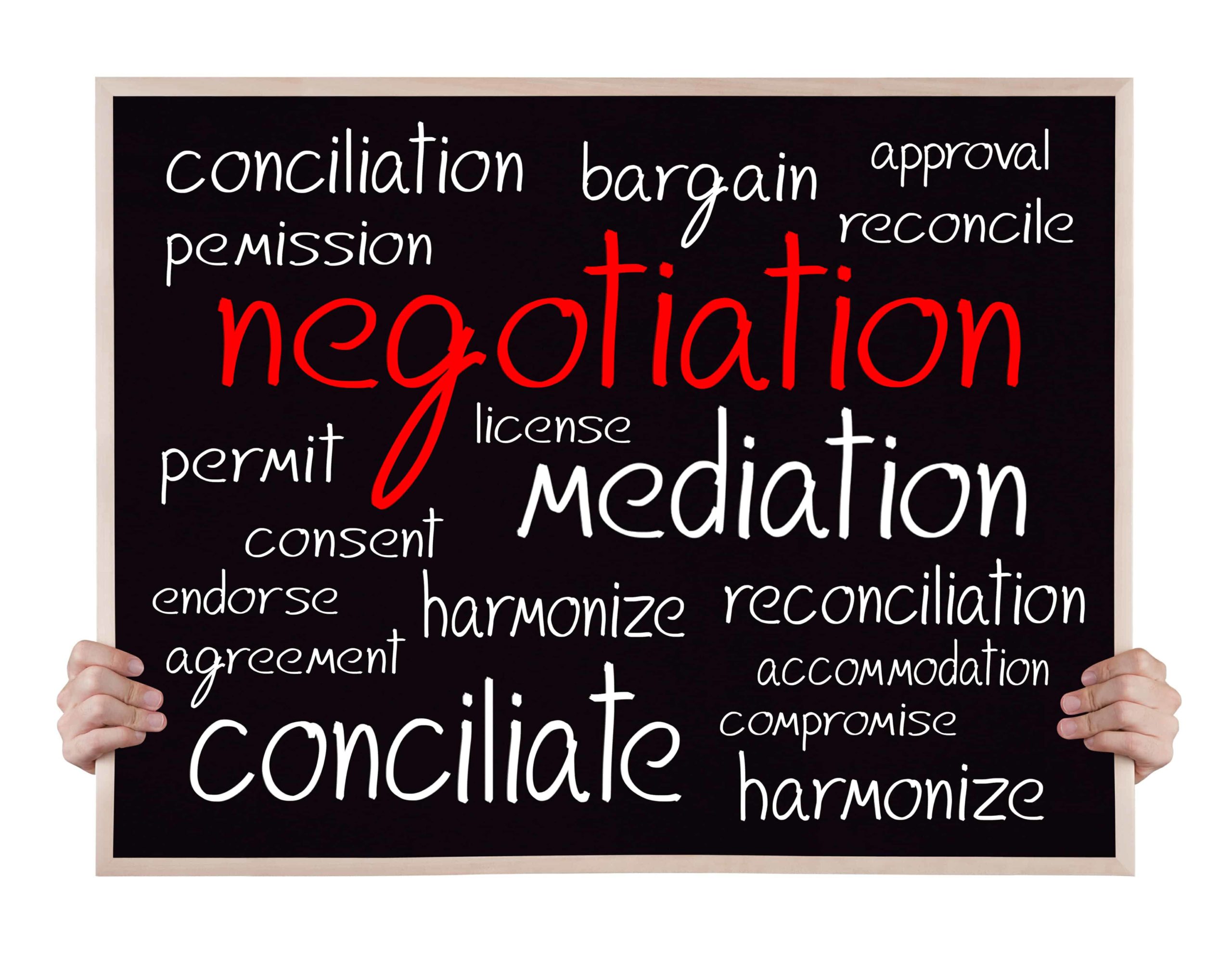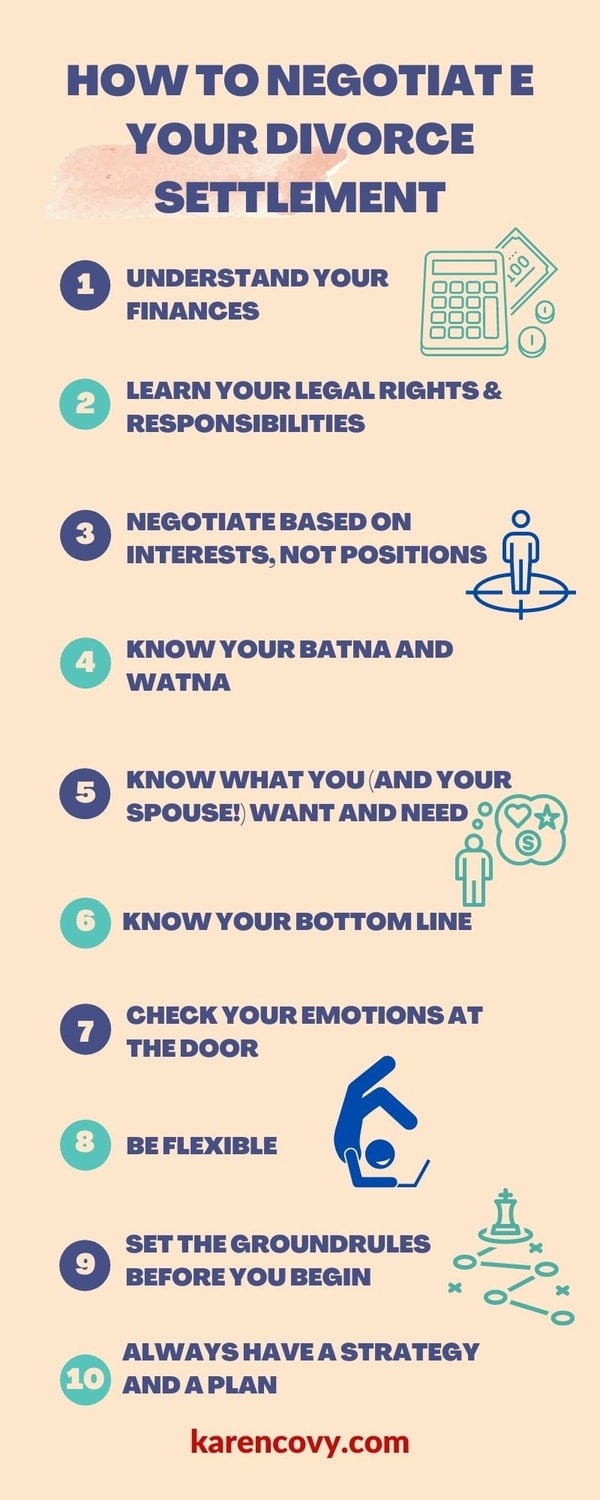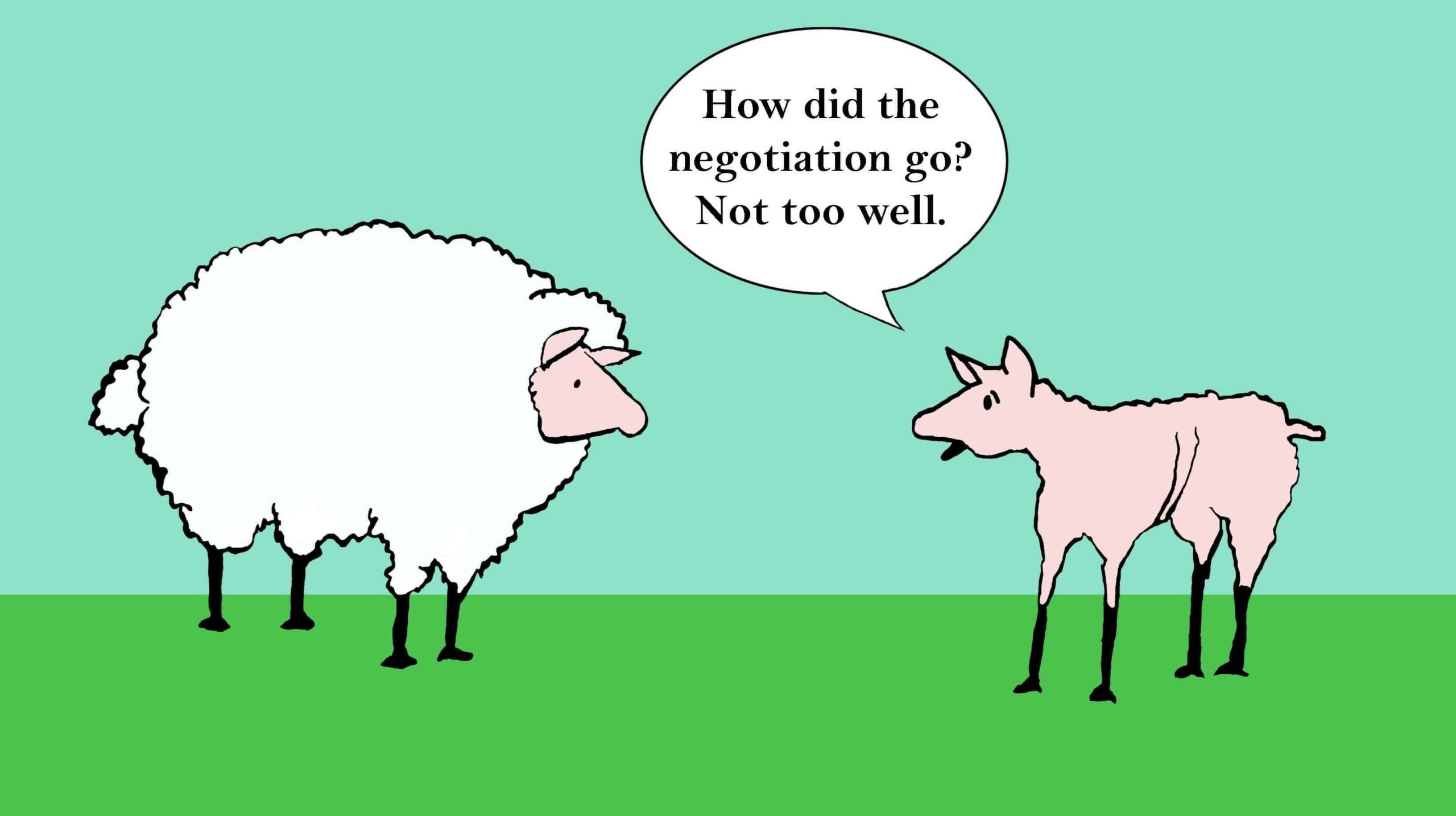The document in your hand is shaking. Your face is flushing like a rocket on a launching pad. You knew negotiating your divorce wouldn’t be easy. But you thought your spouse would at least be a little bit reasonable! Looking at the settlement proposal in your hand, you’re not so sure anymore. Now you’re wondering how to negotiate a divorce settlement that’s fair … without strangling your spouse in the process!
Negotiating your divorce settlement is no one’s idea of a good time. Most lawyers will tell you not to even try to negotiate your divorce settlement yourself.
But what most lawyers won’t tell you is that, even if they are negotiating your divorce settlement, they rarely negotiate EVERYTHING.
Most often, your lawyer negotiates “the big stuff” in your divorce. (… like what happens to the house, your business, the retirement accounts etc.)
But YOU still have to negotiate “the little stuff” directly with your spouse. (… like how to divide up the furniture, the personal items, and the pets.)

Of course, you could pay your lawyer $500 an hour to help you divide up the dishes. But most people aren’t willing to do that … and most lawyers don’t want to do it!
That means that, like it or not, YOU will be negotiating at least some pieces of your divorce settlement.
Of course, there’s a huge difference between negotiating a few small things, and negotiating EVERYTHING in your divorce.
But, if you’re like most people, you probably don’t have much negotiation training. So, chances are, you’d like to offload as much of your divorce negotiation as you can onto your lawyer.
But is that the best idea?

The Benefits of Negotiating Directly with Your Soon-to-Be-Ex
Negotiating your own divorce settlement can save you time and money. … a LOT of time and money.
By eliminating the middlemen (your lawyers) you can often settle your divorce issues in a matter of days or weeks instead of months or years. When you do that, you’ll also save tens of thousands of dollars in legal fees by eliminating the traditional “back-and-forth” negotiations that lawyers go through.
Plus, when you and your spouse negotiate directly with each other, the divorce settlement you reach becomes YOUR agreement. It’s not something that your lawyers drew up and then crammed down your throats.
As a result, both you and your spouse are much more likely to abide by that agreement later. That can be hugely important, especially if you have kids together and have to act as co-parents for years.
Divorce courts are packed with people fighting with their spouse AFTER they are divorced. Negotiating your own divorce agreement directly with your spouse makes it way less likely that either one of you will end up in divorce court fighting over that agreement later.

The Dangers of Negotiating for Yourself
Of course, negotiating for yourself can be dangerous.
If you can’t speak up for yourself, or you can’t stand up to your spouse, then negotiating a fair divorce settlement becomes next to impossible. If you don’t understand your finances and aren’t willing to learn what they are and how they work, then negotiating for yourself could be financially disastrous.
What’s more, if you try to negotiate when you don’t know HOW to negotiate, or you don’t know what your legal rights and responsibilities are, you can end up giving away the farm without even realizing it.
In the end, that’s what everyone is most afraid of.
They’re afraid they’ll lose their shirt in a divorce negotiation because they’ll get taken advantage of and make big mistakes.
The problem is that most people WILL end up negotiating with their spouse at some point about some things.
For example, you probably will directly negotiate the way you divide up the stuff that’s in your house. You may negotiate who gets which car.
You may also end up directly negotiating many of the issues surrounding your kids. For example, you may be able to work out your parenting schedule and vacation time yourself, without getting the lawyers involved.
Even if you don’t negotiate any “kid issues” yourself at first, you definitely will do so later.
Countless scheduling changes and parenting issues arise whenever you’re raising kids with anyone. To think that you won’t have to negotiate any of those issues with your soon-to-be-ex is unrealistic.
What’s more, if your divorce starts dragging on, and your legal fees start skyrocketing, you may find yourself negotiating most of your divorce issues yourself just so you can finally get your divorce behind you!
Because you WILL have to negotiate with your spouse at some point, learning a few negotiation techniques now is critically important. Having even basic negotiation skills will serve you well both during your divorce, and long after.
Here are 10 tips for how to negotiate with your spouse, or your ex.

How to Negotiate a Divorce Settlement with Your Spouse: 10 Strategies You MUST Know
1. Understand Your Finances BEFORE You Open Your Mouth.
If you don’t know what your financial situation is, or you don’t understand how your finances work, you need to get an education FIRST! You should never try to negotiate anything you don’t understand.
You wouldn’t ride in a car being driven by a blind man. Trying to negotiate a divorce settlement when you’re financially blind is no different.
There are plenty of qualified divorce financial advisors and regular financial planners who can explain your finances to you. You MUST educate yourself about your finances BEFORE you start your negotiations.
(And if, you still don’t feel comfortable with your finances even after you’ve tried to learn about them, then don’t negotiate the financial side of your divorce yourself! The cost of lawyer-led negotiation is nothing compared to what you will lose by negotiating a bad financial settlement.)2. Learn Your Legal Rights and Responsibilities – Especially Regarding Your Kids.
If you don’t understand your legal rights and responsibilities BEFORE you negotiate a divorce settlement, you’re very likely to make an agreement you will later regret. What’s more, if your agreement doesn’t comply with what the law requires, the judge will NOT approve it.

If the judge doesn’t approve your agreement, s/he will not divorce you!
That’s the first reason why knowing your legal rights and responsibilities before you negotiate is so critical.
The second reason why knowing your legal rights and responsibilities BEFORE you negotiate is so important is that once you make a deal, it’s very hard to go back on it. Even if the deal you made isn’t legally binding until you sign it (and you don’t sign it!) changing that deal after you and your spouse thought you HAD a deal, ALWAYS causes hard feelings.
That makes re-negotiating your deal extremely difficult. (NOTE: That’s true even if your lawyer told you that signing the deal you made would be legal or financial suicide!)
The bottom line is that your education MUST come first.
If you don’t know what the law requires in your divorce, then, spend an hour or two with a good divorce lawyer or a divorce coach first. In other words, do your homework BEFORE you start negotiating.

3. Negotiate Based on Interests Not Positions.
Most people think that when you negotiate, you start by deciding what you want. Then you double whatever you want. (… because you always start negotiating by asking for MORE than what you really want!) Your spouse presumably does the same thing. Then you go back and forth until somehow you make an agreement.
Here’s what you don’t realize. Negotiating that way is HARD! It’s negotiating based on “positions.” (i.e. I want this. You want that. Okay, who’s going to give in?)
A much more effective way to learn how to negotiate your divorce settlement is to forget about your position. Instead, you negotiate based upon your interests AND your spouse’s interests.
In other words, you focus on what really matters to you, rather than on what each of you wants or thinks you “should” have. You also discuss the reasons why you want something. That makes the conversation deeper, and the negotiation more effective.
For example, many divorce negotiations start out with one spouse saying, “I want the house and I won’t agree to anything unless I get it.” That’s a position.
If you were negotiating based on interests one of you might say, “We both want the kids to stay in the same school district. There are no rental houses around here. So one of us needs to stay in the house until the kids finish school. I’d like to be that person because I can afford the mortgage payments on my own.” That’s negotiating based on interests.
Negotiating based on interests gives you flexibility. It also makes negotiating easier. Your negotiation becomes less about “who gets the house?” and more about “how can we both get decent places to live and make sure the kids can stay in the same school?”
If you and your spouse can both negotiate based on your interests, you’ll be better able to craft a divorce settlement that’s a “Win/Win” for both of you.
4. Know Your BATNA and your WATNA.
A key negotiation strategy involves knowing your BATNA and WATNA.
BATNA stands for “Best Alternative to a Negotiated Agreement.” WATNA stands for “Worst Alternative to a Negotiated Agreement.” You need to know both to negotiate successfully.
In the context of divorce, your BATNA and WATNA will be the best and worst things that could happen to you if you don’t settle your case and have to go to trial.
How do you figure out your BATNA and your WATNA? Ask your lawyer what would be the best and worst things that could happen if you go to trial. Once you know that you can figure out whether going to trial would ever make sense.
For example, if your spouse’s BEST settlement proposal is WORSE than the worst you could do at trial, then accepting that settlement proposal wouldn’t make sense. In that case, you would do better if you let a judge decide your divorce.
(To learn more about how to use your BATNA and WATNA check out Getting to Yes, by Roger Fisher and William Ury.)
5. Know What You (AND Your Spouse) Want and Need.
Knowing what you want sounds so simple. Yet so many people wander through their divorce wanting “what’s fair” without ever stopping to consider what “fair” really looks like. They can often tell you what they DON’T want. But ask them what they DO want, and it’s hard to get a straight answer.
Yet, when you’re negotiating a divorce settlement you have to know exactly what you want. You also need to know what you need. If you don’t know what you want and need, you’ll never be able to negotiate a divorce settlement that satisfies those wants and meets those needs.
But what many people don’t realize is that they also need to know what their spouse wants and needs, too. (Knowing your spouse’s BATNA and WATNA wouldn’t hurt either!)
Here’s why.
The more you have insight into what your spouse wants and needs, the more you can negotiate in a manner that will satisfy both of you. Sure, at this point you may think you don’t care about your spouse’s satisfaction. But knowing where your spouse is coming from is critical in negotiating a settlement that will actually stick.
The more you can create a “win-win” situation for both you and your spouse, the more likely you are to succeed in settling your case amicably, and on terms that you want.

6. Know Your Bottom Line.
One of the most important negotiation strategies you must understand when dealing with your ex is to know your bottom line BEFORE you negotiate. As Kenny Rogers says, “You gotta know when to hold ‘em and 0know when to fold ‘em.”
If your spouse won’t settle on terms you can live with, then you have to be ready and able to walk away. That means you have to know what you can and can’t live with before you start negotiating.
It also means that you have to have the courage to reject proposals that fall seriously short.
What’s more, you’ve also got to know whether your bottom line is realistic.
You may want the sun, the moon and the stars in your divorce settlement. But if the most you are legally entitled to get is a passing asteroid, then clinging to your desires isn’t smart. It’s ridiculous.
When your “bottom line” isn’t realistic, negotiating a fair agreement is next to impossible.
7. Check Your Emotions at the Door.
Yes, this one is tough.
That’s why most people would rather let their lawyer negotiate their divorce settlement than try to do it themselves. (That’s also why having a good therapist while you are getting divorced is invaluable!)
Obviously, having your lawyer conduct your divorce negotiations will help you keep your emotions out of it. But what most people don’t realize is that, even if their lawyer is doing the actual negotiating, THEY are still calling the shots!
Your lawyer can only make a settlement offer if YOU agree to it. They can’t force you to be reasonable, or to make a deal.
So, whether you’re the one negotiating the settlement, or you’re the one sitting on the sidelines directing the negotiations, it doesn’t matter. You still need to keep your emotions in check!
(Of course, it’s hard NOT to be emotional during your divorce negotiation. But nothing will derail the negotiation process faster than letting your emotions cloud your reason.

8. Be Flexible.
Your way is not the only way to do things. (Sorry!)
The more you can keep an open mind and brainstorm alternatives, the more likely you will be to settle your divorce amicably.
If you’re not sure what kinds of alternatives you have, ask your lawyer. If you’re negotiating with the help of a mediator, ask the mediator.
The divorce professionals can help come up with various settlement scenarios that will allow you to meet everyone’s needs in ways you might not have thought about.
Also, listen to your spouse’s ideas. (I know. That’s hard.) But, it’s at least theoretically possible that your spouse will have creative settlement ideas that just might work.
The bottom line is that the more options you have to choose from, the more likely you will land on a settlement that works for everyone.
9. Set the Ground Rules Before You Begin.
When and where you negotiate matters. So does how you negotiate.
You and your spouse can negotiate alone, face to face. Or you can negotiate with your lawyers present. (Fair warning, though. Lawyers tend to take over any negotiation they’re at!) Or, you can negotiate with the help of a mediator.
If you and your spouse are negotiating alone, do it in a neutral place. Set aside a couple of hours so that neither one of you is worried about missing an appointment if the negotiations take too long.
Decide in advance how long the negotiation will last and who will write down what you agree on. You also want to be clear about whether you each need to check with your attorneys before your agreement is truly final.
Nothing will destroy your agreement (AND poison what’s left of your relationship!) faster than if one of you tries to change something AFTER you both thought you had reached an agreement.

10. Always Have a Strategy and a Plan.
Knowing what you want and need BEFORE you negotiate is critical. But, if you don’t have concrete negotiation strategies that will help you achieve your goals, then your chances of actually reaching an agreement that meets those goals goes down dramatically.
What kind of strategy do you need?
That depends on what’s involved in your divorce.
But, in general, the way to create a solid negotiation strategy starts with knowing what you want in advance. It also involves brainstorming as many different ways that you can get what you want as possible. The more options you have, the more flexible your negotiation strategy can be.
Another good negotiation strategy is to know what your spouse wants. (Or, at least, you need to have put some serious thought into what s/he “probably” wants.) That way you can brainstorm ways to get your spouse what s/he wants while still getting what YOU want!
You can also use your lawyer, your financial planner, and even your therapist to help you create your negotiation strategy. Each professional will have unique insights that you can use to help you negotiate a deal.
(And, of course, if your lawyer will be negotiating with or for you, you will gain the benefit of having all his/her negotiating experience as well.)
Should You Negotiate Your Own Divorce?
Negotiating your divorce with your spouse can save you a huge amount of time and money. At the same time, direct negotiation isn’t for everyone.
If you want to give it a go, follow the rules laid out in this article. Consult with your divorce team. And, above all, be prepared.
Finally, remember that, in most cases, negotiating a divorce settlement isn’t rocket science. You can learn how to negotiate a divorce settlement that’s fair without getting a PhD from Harvard.
At the same time, if you have complicated finances or enormously difficult parenting issues to deal with, then you may want to leave the lion’s share of your divorce negotiation to the divorce professionals.

